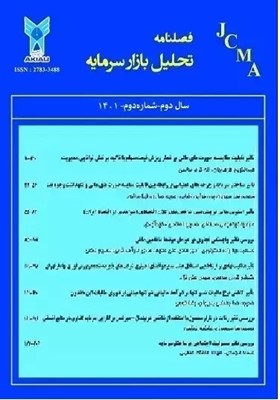بررسی تأثیر سوگیری رفتاری خودکنترلی بر رفتار مالی و رفاه مالی از طریق نقش تعدیلگر سواد مالی در بورس اوراق بهادار تهران
محورهای موضوعی : فصلنامه تحلیل بازار سرمایه
منیژه محمدی
1
,
آرش نادریان
2
*
,
مجید اشرفی
3
,
جمادوردی گرگانلی دوجی
4
![]()
1 - دانشجوی دکتری
2 - هیات علمی
3 - هیات علمی
4 - هیأت علمی
کلید واژه: مالی رفتاری, سواد مالی, خودکنترلی, رفتار مالی, رفاه مالی,
چکیده مقاله :
بازارهای سرمایه نقش با اهمیتی در اقتصاد داشته بنابر این عملکرد مناسب آنها عامل کلیدی در تأمین رشد اقتصادی خواهد بود، لذا اگر بازارهای سرمایه کارآ باشند، توسعه اقتصادی تحقق مییابد. از طرفی ، از آنجاکه در حال حاضر بازارسرمایه کشور با استقبال فراوانی از سوی سرمایهگذاران روبرو شده است، بیتردید، بررسی تورشهای رفتاری سرمایهگذاران از اهمیت بسیار زیادی دارد. لذا در این مطالعه به بررسی تأثیر سوگیری رفتاری خودکنترلی بر رفتارمالی و رفاه مالی از طریق نقش تعدیلگرسواد مالی سرمایهگذاران پرداخته شد. برای این منظور، جامعه آماری شامل سرمایهگذاران انفرادی، معاملهگران و کارگزاران بورس اوراق بهادار تهران بوده که بهطور مستقیم در بازار فعالیت داشتهاند. همچنین نمونه آماری با استفاده از فرمول کوکران 421 نفر تعیین شد. جهت تجزیه و تحلیل دادهها از مدل معادلات ساختاری به روش PLS استفاده شد. نتایج نشان داد که متغیر خودکنترلی از تأثیر معنادار مثبتی بر رفتار مالی، رفاه مالی و برخوردار میباشد. بدین مفهوم که با افزایش خودکنترلی سرمایهگذاران بازار سهام، رفتار مالی، رفاه مالی آنان افزایش مییابد. همچنین، با وارد کردن متغیر سواد مالی به عنوان متغیر تعدیلگر، شدت رابطه بین خودکنترلی و رفتارو رفاه مالی افزایش مییابد. بدین مفهوم که سواد مالی سرمایه-گذاران انفرادی بازار سهام، باعث تشدید رابطه مثبت بین خودکنترلی با رفتار و رفاه مالی آنان میشود.
Capital markets have an important role in the economy, so their proper performance will be a key factor in ensuring economic growth, so if capital markets are efficient, economic development will be realized. On the other hand, since currently the country's capital market has been welcomed by investors, it is undoubtedly very important to examine the behavior patterns of investors. Therefore, in this study, the effect of self-control behavioral bias on financial behavior and financial well-being was investigated through the moderating role of investors' financial literacy. For this purpose, the statistical population included individual investors, traders and brokers of Tehran Stock Exchange who were directly active in the market. Also, the statistical sample was determined using Cochran's formula of 421 people. To analyze the data, the PLS structural equation model was used. The results showed that the self-control variable has a significant positive effect on financial behavior, financial well-being and In the sense that with the increase of self-control of stock market investors, their financial behavior and financial well-being will increase. Also, by introducing the variable of financial literacy as a moderating variable, the intensity of the relationship between self-control and behavior and financial well-being increases. In the sense that the financial literacy of individual stock market investors increases the positive relationship between self-control and their behavior and financial well-being.
_||_

